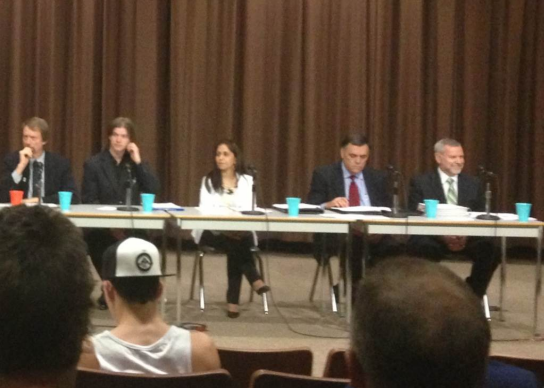Print Edition: May 8, 2013
UFV’s Political Science Student Association hosted the Abbotsford South all-candidates debate this past Monday. The debate was moderated by department head, professor Hamish Telford and held in room B101 of the Abbotsford campus. Candidates present include John van Dongen running independently, Darryl Plecas for the BC Liberal Party, Lakhvinder Jhaj for the BC NDP Party, Marcus Halliday on behalf of BC Excalibur Party’s Patricia Smith, and Steve Findlay for the BC Marijuana Party. Questions fielded from the audience touched on education, transit issues between Fraser Valley cities and the environmental impact of installing new pipelines. We’ve summarized their views below; please note that these are not exact quotes except unless otherwise stated.
What measurable steps are you going to take to reduce student debt loads, and make post-secondary education more affordable for students?
van Dongen: Lever tuition appropriately to ensure students have adequate access to the courses they require in order to finish their degrees within four years, instead of five or more.
Plecas: Avoid increasing student fees, and find other ways to pay for education: “In those countries that access their natural resources in a big way, education is free.”
Jhaj: Invest in non-refundable grants for recent high school graduates up to $1500 to get skill training.
Halliday: Introduce a program where students would receive education for five years (in similar fashion to the military) in order to complete their diplomas, followed by five years working for the government.
Findlay: Increase the funding for education and find other sources of income. Proposing both by smarter spending. The government found $10 million to arrest people for pot offences last year, when universities could have used that money for better purposes.
UFV students recently passed a referendum to provide a shuttle between Abbotsford and Chilliwack campuses, what are your plans to take the responsibility of this off the shoulder of students? How do you feel about bringing light rail transit in the Fraser Valley?
Findlay: Abbotsford doesn’t have the kind of population density to support a light rail system; a bus system is more appropriate.
Halliday: There is a need for a transit connection. Mission has the West Coast Rail system, why not extend it over the bridge and in to Abbotsford and out to Chilliwack? This solves the issue of reliable transit between cities and allows for American tourists to shop at local businesses in Abbotsford.
Jhaj: Invest part of the carbon tax money on accessible transit around the province.
Lots of young people want to go downtown, and there isn’t always a designated driver so many rely on several transit trips in order to get home safely.
Plecas: It’s a crime that students have such difficulty moving from one campus to another. More frequent transit is required, but is going to cost one way or another. There should be joint funding from the students, the university and the government to make this happen.
van Dongen: The UFV shuttle is only point to point, and we still suffer on the community side of transit. Our system is half the size of Kelowna’s, which has an equivalent population. Transit density needs to go up, local MLA is responsible for creating an economic service to students and all citizens in the community.
There have already been 78 leaks and spills on the trans mountain pipeline, how will your party ensure that our river and drinking water will remain safe from toxic chemicals being transported via that pipeline?
Findlay: Institute regulatory process that will approve or reject that proposition. Community activists, experts and ocommunity members should have the opportunity to bring their evidence to the tribunal for review before any decisions are made.
Halliday: Technology exists today to run fibre optic sensor cables down the line to detect leaks. Install automated shut off values to reduce the risk of environmental contamination. It’s expensive but as profits per quarter are in the billions, it’s affordable.
Jhaj: Against the pipeline. Clean drinking water is too precious to risk.
Plecas: Must be good to all people and the environment. Early warning system and response teams must be in place to ensure safety.
van Dongen: Appropriate response protocols and prevention protocols must be in place and supported. Inspectors should work for the public. Not concerned about the cost as much as about getting [safety] right the first time. Pipelines need to respect our high quality farm land, and we have yet to see one that does.



